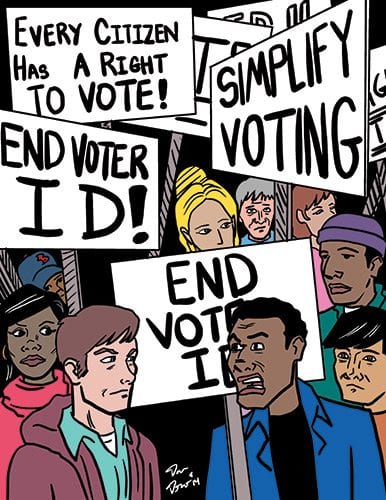
The recent decision of the Pennsylvania court to strike down the new voter ID law is inspiring. It should remind blacks that the drive for voting rights has begun anew.
North Carolina has become the poster child of the eight states that have established in 2013 more restrictive voting rights for future elections. The others are Arkansas, Indiana, Montana, Nebraska, North Dakota, Tennessee and Virginia. Civil libertarians have to remain alert to efforts by conservatives to impose unreasonable restrictions on access by citizens to the polls.
The North Carolina Legislature has approved, among other measures, reductions in early voting, strict voter ID provisions, and the elimination of same-day voter registration. According to an analysis of the November 2012 election, African Americans were 23 percent of registered voters in North Carolina, but they were 29 percent of early voters, 34 percent of those without state-issued IDs, and 41 percent of those who registered on Election Day.
It is clear from the data that the intention of the North Carolina statute was not to make voting easier and more accessible. The Department of Justice, the North Carolina NAACP and the ACLU have all filed suit to have the election changes ruled to be in violation of the Civil Rights Act. The judicial process for achieving this is more difficult since the U.S. Supreme Court has found Section 4 of the Act to be unconstitutional.
Once again, African Americans must battle to secure voting rights in some jurisdictions. This battle began when freed slaves became citizens with passage of the 14th Amendment of the U.S. Constitution and were granted the right to vote in 1870 by the 15th Amendment.
Those in power in the South during the Jim Crow era had no intention of permitting blacks to vote and assume control of the government. In many counties and in some states the majority population was black. In South Carolina in 1870, 59.4 percent of the residents were black and in Mississippi, 54.1 percent were black. In Alabama and Louisiana the count was too close to assure political victory for the plantation owners.
The prospect of becoming politically marginalized induced the sons of the Confederacy to resort to dehumanizing oppression to keep blacks away from the polls. The freed slaves had no choice for survival but to accept the fear and humiliation. Despite the danger, there was always a demand for black suffrage in the South from 1870 on.
Progress was slow until the Civil Rights Movement began to mobilize in the 1950s. While the Civil Rights Act of 1957 did not generate much enthusiasm or attention, it proved to be a significant stratagem in ending voting discrimination. It established the Civil Rights Division within the Department of Justice. The FBI under J. Edgar Hoover had not been very effective in prosecuting racial discrimination offenses.
Voting rights became a major focus of the Civil Rights Movement. On March 7, 1965, John Lewis led 600 protestors on a march from Selma, Ala. to Montgomery. On the Edmund Pettus Bridge they were viciously attacked by state and local police with tear gas, clubs, dogs and water hoses. International publicity of the event was a national embarrassment. On Aug. 6, just five months later, President Lyndon Johnson signed the Voting Rights Act.
Last June 25, in a 5-to-4 decision, the U.S. Supreme Court ruled in the case of “Shelby County v. Holder” that Section 4 of the Voting Rights Act is unconstitutional. That section required states and voting jurisdictions with a history of discrimination to submit any proposed change in voting rules for approval by the attorney general or the federal court. Now it is more difficult to challenge questionable changes in the voting laws.
Once again blacks and civil libertarians must challenge rules that restrict the voting rights of the poor, the elderly and minorities. But this time it will not be necessary to face the physical danger and threats of the Jim Crow era. It should be a priority in 2014 to secure what heroic elders have so valiantly achieved.






